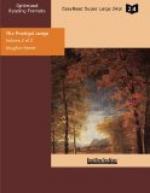“Did you get those dimensions out of the jug?” inquiry Mahaffy, with a frightful bark that was intended for a sarcastic laugh.
“Sir, it is not in your province to judge me by my present degraded associates. Near the house I have described—my father’s and his father’s before him, and mine now—but for the unparalleled misfortunes which have pursued me—lived a family by the name of Hazard. And when I went to the war of ’i2—”
“What were you in that bloody time, a sutler?” inquired Mahaffy insultingly.
“No, sir—a colonel of infantry!—I say, when I went to the war, one of these Hazards accompanied me as my orderly. His grandson is back of that curtain now—asleep—in my bed!” Mahaffy put down his glass.
“You were like this once before,” he said darkly. But at that instant the shuck tick rattled noisily at some movement of the sleeping boy. Mahaffy quitted his chair, and crossing the room, drew the quilt aside. A glance sufficed to assure him that in part, at least, the judge spoke the truth. He let the curtain fall into place and resumed his chair.
“He’s an orphan, Solomon; a poor, friendless orphan. Another might have turned him away from his door—I didn’t; I hadn’t the heart to. I bespeak your sympathy for him.”
“Who is he?” asked Mahaffy.
“Haven’t I just told you?” said the judge reproachfully. Mahaffy laughed.
“You’ve told me something. Who is he?”
“His name is Hannibal Wayne Hazard. Wait until he wakes up and see if it isn’t.”
“Sure he isn’t kin to you?” said Mahaffy.
“Not a drop of my blood flows in the veins of any living creature,” declared the judge with melancholy impressiveness. He continued with deepening feeling, “All I shall leave to posterity is my fame.”
“Speaking of posterity, which isn’t present, Mr. Price, I’ll say it is embarrassed by the attention,” observed Mahaffy.
There was a long silence between them. Mr. Mahaffy drank, and when he did not drink he bit his under lip and studied the judge. This was always distressing to the latter gentleman. Mahaffy’s silence he could never penetrate. What was back of it—judgment, criticism, disbelief—what? Or was it the silence of emptiness? Was Mahaffy dumb merely because he could think of nothing to say, or did his silence cloak his feelings-and what were his feelings? Did his meditations outrun his habitually insulting speech as he bit his under lip and glared at him? The judge always felt impelled to talk at such times, while Mahaffy, by that silence of his, seemed to weigh and condemn whatever he said.
The moon had slipped below the horizon. Pleasantville had long since gone to bed; it was only the judge’s window that gave its light to the blackness of the night. There was a hoofbeat on the road. It came nearer and nearer, and presently sounded just beyond the door. Then it ceased, and a voice said:




